英语时态一表通
(完整版)英语十六种时态表格(附准确例句)
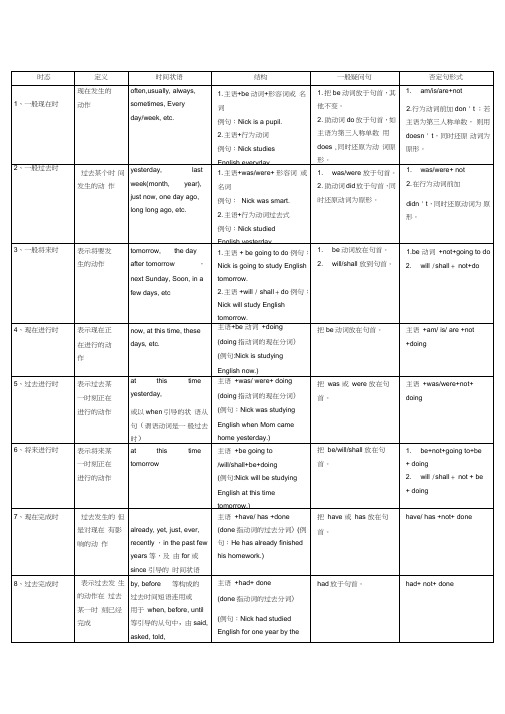
过去发生的 动作到现在 还在继续进 行
Since this morning,
Since I was five, etc.
主语+have/has+been+ doing
(例句:Nick has been studyingEnglish since
this morning.)
把have/has放在句首。
wouldhavestudied
English for three months by the end of this year.
N/A
Would+not
16、过去将来完
成进行时
表示从过去 某时刻看,到 未来某时刻 以前会一直 在进行的动 作
常用于宾语从句中
例句:He said that Nick wouldhavebeen
1.把be动词放于句首, 其他不变。
2.助动词do放于句首, 如主语为第三人称单数 用does,同时还原为动 词原形。
1.am/is/are+not
2.行为动词前加don't; 若主语为第三人称单数, 则用doesn't,同时还原 动词为原形。
2、一般过去时
过去某个时 间发生的动 作
yesterday,last
把be/will/shall放在句
首。
1.be+not+going to+be
+doing
2.will/shall+not+be
+doing
7、现在完成时
过去发生的 但是对现在 有影响的动 作
already, yet, just, ever, recently,in the past few years等,及由for或since引导的时间状语
英语16种时态表格总结

英语16种时态表格总结时态是英语语法中非常重要的一部分,它们用于表示动作发生的时间、顺序和持续性等信息。
了解和掌握英语的各种时态对于学习语言的人来说至关重要。
本文将总结英语中常用的16种时态,并提供表格形式的概览,方便读者更好地理解和运用。
一、一般现在时(Simple Present)表示经常性、习惯性、客观真理形式,以及现在的动作、状态等。
肯定句:主语+动词原形否定句:主语+do/does not+动词原形疑问句:Do/Does+主语+动词原形?二、一般过去时(Simple Past)表示过去某个时间发生的动作或状态。
肯定句:主语+动词过去式否定句:主语+did not+动词原形疑问句:Did+主语+动词原形?三、一般将来时(Simple Future)表示将要发生的动作或状态。
肯定句:主语+will+动词原形否定句:主语+will not+动词原形疑问句:Will+主语+动词原形?四、现在进行时(Present Continuous)表示现在正在进行的动作或状态。
肯定句:主语+am/is/are+动词现在分进行否定句:主语+am/is/are not+动词现在分进行疑问句:Am/Is/Are+主语+动词现在分进行?五、过去进行时(Past Continuous)表示过去某个时间正在进行的动作或状态。
肯定句:主语+was/were+动词现在分进行否定句:主语+was/were not+动词现在分进行疑问句:Was/Were+主语+动词现在分进行?六、将来进行时(Future Continuous)表示将来某个时间正在进行的动作或状态。
肯定句:主语+will be+动词现在分进行否定句:主语+will not be+动词现在分进行疑问句:Will+主语+be+动词现在分进行?七、现在完成时(Present Perfect)表示过去发生的动作对现在造成的影响或结果。
肯定句:主语+have/has+动词过去分词否定句:主语+have/has not+动词过去分词疑问句:Have/Has+主语+动词过去分词?八、过去完成时(Past Perfect)表示过去某个时间之前发生的动作。
英语十六种时态完整表
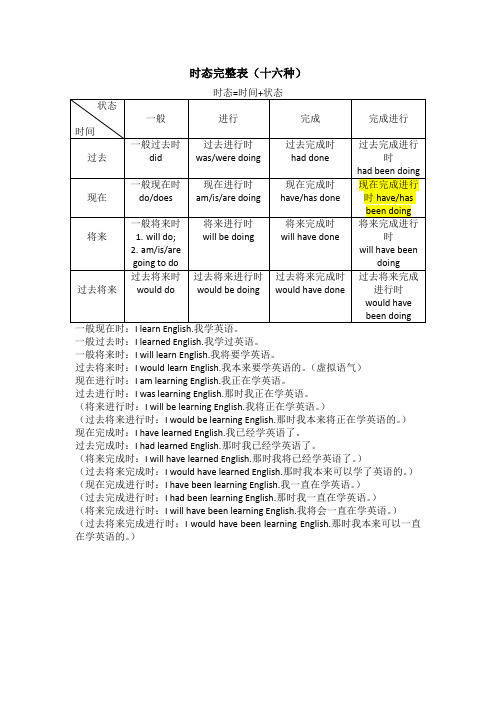
时态完整表(十六种)
一般过去时:I learned English.我学过英语。
一般将来时:I will learn English.我将要学英语。
过去将来时:I would learn English.我本来要学英语的。
(虚拟语气)
现在进行时:I am learning English.我正在学英语。
过去进行时:I was learning English.那时我正在学英语。
(将来进行时:I will be learning English.我将正在学英语。
)
(过去将来进行时:I would be learning English.那时我本来将正在学英语的。
)现在完成时:I have learned English.我已经学英语了。
过去完成时:I had learned English.那时我已经学英语了。
(将来完成时:I will have learned English.那时我将已经学英语了。
)
(过去将来完成时:I would have learned English.那时我本来可以学了英语的。
)(现在完成进行时:I have been learning English.我一直在学英语。
)
(过去完成进行时:I had been learning English.那时我一直在学英语。
)
(将来完成进行时:I will have been learning English.我将会一直在学英语。
)(过去将来完成进行时:I would have been learning English.那时我本来可以一直在学英语的。
)。
英 语 时 态 一 表 通

英语时态一表通代词(pronouns)的用法-----人称/物主代词prepositions (介词) 常用介词的基本用法e.g. in , on, at, from, to, into, by, with, for, about, after, before,across, through, over, between, among, above, below, like, etc.1. at: 1) 表示时间:at 7 o’clock, at no on, at midnight , at the age of2) 表示地点,在……(地点),常用于小地点at a village, at school, at home2. in 1) 表示时间:年、月、季节、早晨、下午、晚: in 1976, in October, in spring /winter, in the morning/afternoon/ evening, in a week/ a year/ a month2) 表示地点、场所(大地点)arrive in Beijing/ Shanghai/ New York3) 穿着、戴着(衣服、帽子等)be in red, be in raincoat, be in blue4)表示“ 用……语言” in English, in Chinese3. on 1) 表示时间:“在……时候”on Monday, on October 1st, on Sunday morning, on New Year’s Eve2) 表示位置“在……上”(与物体接触)on the table, on the desk, on the wall4. for 1) 表示一个时间长度I haven’t seen him for a long time.2) 表示目标:“为……” My father buys a birthday cake for me every year.5. about 1) 表示“在……周围” They are running about the playground.2) 表示“大约” It’s about nine o’cloc k. It takes about two hours.6. after 表示时间“在……以后” the day after tomorrow( 后天), after school7. before 表示时间“在……之前”the day before yesterday, before 9:308. by 1)表示“在……旁边”There is a school by the river.2) 表示“乘/坐……” by bus, by train, by bike, by taxi, by plane, by air9. with 表示“和……在一起” play with, make friends with, be angry with10. of 1) 表示“属于……的” He is the son of my friend.2) 表示“……的数量和种类” a piece of paper, three bottles of water3)表示“……的部分或全部”three of us, all of, a lot of = lots of, a few of时态专练:一. 用括号里的动词的适当形式填空:1. There (be)______some glasses on it.2. He (go)_______to the park every day.3. My uncle (live)______ in Nanjing now.4. ______ Lucy and Lily (like)______China?5. Li Lei(not like)___________ to drink orange soda.6. The girl (go)______ home at 4:30 p.m. every day.7. ______ Kate (speak)______ French? Yes, she does.8. Jim (not ride)______his bike often.9. If he (be)______ free tomorrow, he (go)_________ with us.10. As soon as they (get)______ there next month, he (call)_________me.11. ______Li Ming’s father (have)______ his lunch at home?12. Tom (not do)____________the morning exercises often.13. I (be)______ hungry and my sister (be)_______ thirsty now.14. The baby (have)________ curly hair. 15. Everybody (have)________ a chance to win.16. I (clean)________ my room once a week.17. Nobody(tell)________ them anything. 18. There (be)______ a lot of chicken on the plate.19. Mr. Li (teach)__________ the second grade. 20. The boy (watch)________ TV every evening.二. 用所给词的适当形式填空:1. Tom and his father ____________(swim)now.2. Look! They ____________(run)along the street.3. We _____________(practice)hard these days because we will have a big match next month.4. What _______he _______(do)at nine o’clock last night?5. They ______(listen)to the music at that time.6. When the headmaster came in, the students__________(read)the text.7. We ____________(watch)TV when suddenly the telephone rang.8. She ____________(make)the paper flowers the whole night.9. A: _______ you ______(studying)English? B: Yes, I am.10. Let’s go out. It ______________(not rain)now. 11. Hurry up! Everybody ______________(wait)for you.12. A: _______________(you / listen)to the radio? B: No, You can turn it off.13. I ____________(watch)TV at seven o’clock yesterday evening.14. A: What ____________(you / look)for?B: I ____________(look)for my wallet. There is something important in it.15. Look. It ____________(rain)hard. We’ll get wet if we go out.三. 用所给词的适当形式填空:1. My mother told me, ―you ______ (be) a big boy now. I _______ (think) you can _______ (take) good care of yourself.‖2. Henry _______ (be) a Primary 4 student. He _______________ (study) in our school since 2006.3. Last year, a famous artist _________ (draw) a picture. A rich man _________ (buy) it. All of his friends ________(say) it was really beautiful.4. Last night, a big truck crashed into a bus. The bus _______ (be) on fire. Many firemen ______(come) and _______ (put) out the fire.5. May likes __________ (dance) very much. She _______ (have) three dance lessons at a training school every week.6. What _______the teachers _______(do) this time yesterday?7. I'm afraid you ________(forget) the date, haven't you? 8.——How many times ________ you ________(be) to the Great Wall?——Only once.9. I'm sorry ________(bring)you so much trouble.10. I _____ already _________(finish) my homework.11._____ you ever _______(eat) fish and chips?12. I can't ______(find) my pen._____ you ______(see) it anywhere?13. She _____ never ______(speak) to a foreigner.四. Miss Mok has received a letter from her uncle in England. Fill in the blanks with the correct form of the verbs.I have not written ( not write) to you for a long time. How are you?Let me tell you some good news. Your aunt Mabel and I _______________ (travel) a lot recently! So far, we ____________ (see) two new countries in the UK. Also, we _________ (go) to see our daughter in London last Sunday. She _______________(live) there for two years. Mabel _______________ (stay) with her for three weeks, but I had to come back early for work. Next year we _____________ (go) there again.When I went back home, I ____________(plant) many new flowers in the garden and ___________ (do) a lot of work in the yard. Now I ________(be) quite free. I think I ___________ (spend) more time reading. I _____________ (not read) a good book for a long time.Yours,Uncle David五. Fill in the blanks with the correct form of the verbs.Teddy: I (1) _________(go) to the new shopping mall in Mong Kok yesterday.Rachel: I (2) ______________(be) there once.Teddy: What (3) __________(do) you do there?Rachel: I (4) _________(buy) a toy horse.Martin: My sister and I (5) _________(watch) the film Spider Hero in that shopping mall last Friday.Teddy: That’s a very nice film. I (6) ______________(watch) it three times. Roy, (7) ________ you ________(take) the photos for your project yet?Roy : Yes, I have. I (8) _________ (take) the photos two days ago.Teddy: Oh, no, we (9) _____________ (have) an English test tomorrow. I (10) _______________ (not do) any revision yet. I have to (11) _______ (go) now.Roy: I hope you (12)___________ (get) good marks. Good luck to you, Teddy.六. Fill in the blanks with the correct form of the verbs.Wendy(1)__met__(meet) the postman again when he came home from school yesterday afternoon. He (2)_______(say) hello to the postman. Then they (3)_______(talk) with each other.Wendy asked, ―How long have you (4)_______(work) as a postman?‖The policeman replied, ―I (5)____________(be) a postman since 1978. In fact I (6)______________(work) in the post office for more than twenty years!‖Wendy asked, ―What do you every day?‖The postman said, ―I deliver letters and parcels to people living around here every day. I (7) _______(like) my job very much but I (8)__________(retire) next year.‖Wendy asked, ―What will you do when you retire?‖―Well, I think I (9)________(spend) more time on doing exercise. I (10)__________(do) more drawings too. It is my favourite hobby! I (11)_____________(do) it for many years!‖。
12种时态语态总结表格
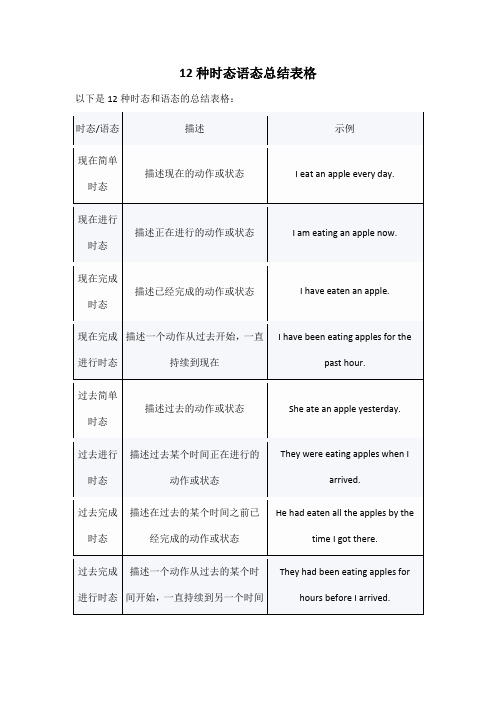
描述在过去的某个时间之前已经完成的动作或状态
He had eaten all the apples by the time I got there.
过去完成进行时态
描述一个动作从过去的某个时间开始,一直持续到另一个时间
They had been eating apples for hours before I arrived.
12种时态语态总结表格
以下是12种时态和语态的总结表格:
时态/语态
描述
示例
现在简单时态
描述现在的动作或状态
I eat an apple every day.
现在进行时态
描述正在进行的动作或状态
I am eating an apple now.
现在完成时态
描述已经完成的动作或状态
I have eaten an apple.
将来简单时态
描述未来的动作或状态
We will eat apples tomorrow.
将来进行时态
描述将来某个时间正在进行的动作或状态
They will be eating apples at 3pm tomorrow.
将来完成时态
描述在将来的某Байду номын сангаас时间之前已经完成的动作或状态
She will have eaten all the apples by the end of the day.
现在完成进行时态
描述一个动作从过去开始,一直持续到现在
I have been eating apples for the past hour.
过去简单时态
描述过去的动作或状态
She ate an apple yesterday.
英语时态一表通

一般现在时主要由动词原形表示,但第三人称单数后要加词尾-s,另外be 和have要根据人称的变化使用特殊的形式。
一般现在时主要表示经常性的动作或存在的状态,还可用来表示普遍真理。
The Yangtze rises in Qinghai. 长江发源于青海。
Actions speak louder than words. 行动胜于言辞。
We have friends all over the world. 我们的朋友遍天下。
二、一般过去时:概念:过去某个时间里发生的动作或状态;过去习惯性、经常性的动作、行为。
时间状语:ago, yesterday, the day before yesterday, last week(year, night, month…), in 1989, just now, at the age of 5, one day, long long ago, once upon a time, etc.基本结构:①be动词;②行为动词否定形式:①was/were+not;②在行为动词前加didn't,同时还原行为动词。
一般疑问句:①was或were放于句首;②用助动词do的过去式did 提问,同时还原行为动词。
一般过去时由动词过去式表示,动词be 根据人称有was和were两个词形,规则动词在词尾加-d-或ed;其他动词参阅不规则动词变化表, 该时态主要表示过去某时发生的动作或情况。
It’s a pity that you did not go to the movie. 很遗憾你没有去看那部电影。
Many people died in the tsunami that took place in Thailand.很多人在泰国的那次海啸中遇难丧生。
三、现在进行时:概念:表示现阶段或说话时正在进行的动作及行为。
时间状语:now, at this time, these days, etc.基本结构:am/is/are+doing否定形式:am/is/are+not+doing.一般疑问句:把be动词放于句首。
英语十六种时态表格
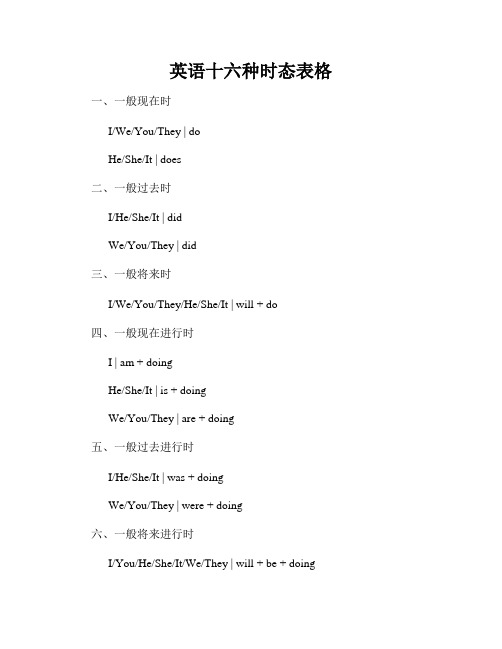
英语十六种时态表格一、一般现在时I/We/You/They | doHe/She/It | does二、一般过去时I/He/She/It | didWe/You/They | did三、一般将来时I/We/You/They/He/She/It | will + do四、一般现在进行时I | am + doingHe/She/It | is + doingWe/You/They | are + doing五、一般过去进行时I/He/She/It | was + doingWe/You/They | were + doing六、一般将来进行时I/You/He/She/It/We/They | will + be + doing七、一般现在完成时I/You/We/They/He/She/It | have/has + done八、一般过去完成时I/You/We/They/He/She/It | had + done九、一般将来完成时I/You/We/They/He/She/It | will have + done十、现在完成进行时I/You/We/They/He/She/It | have/has been + doing 十一、过去完成进行时I/You/We/They/He/She/It | had been + doing十二、将来完成进行时I/You/We/They/He/She/It | will have been + doing 十三、现在完成时I/You/We/They/He/She/It | have/has + done十四、过去完成时I/You/We/They/He/She/It | had + done十五、将来完成时I/You/We/They/He/She/It | will have + done十六、过去将来时I/You/He/She/It/We/They | would + do以上是英语中的十六种时态及其对应的动词形式。
初中英语八种时态归纳总结表格版
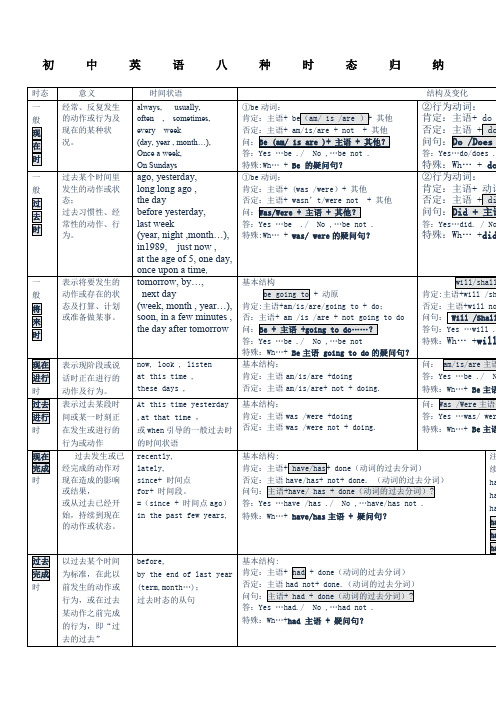
②would +do . 肯定:主语+ would 否定:主语+ woul 问句:Would 主语 答句:Yes …woul
特殊:Wh… +wou
The next day (morning,year…), the following month (week…)
基本结构: 肯定:主语+ was/were going to + do; 否:主语+ was/were+ not going to do 问:Be + 主语 +going to do……? 答:Yes …be ./ No ,…be not 特殊:Wh…+ Be 主语 going to do 的疑问句?
结构及变化
②行为动词: 肯定:主语+ do( 否定:主语 + do 问句:Do /Does
答:Yes…do/does .
特殊:Wh… + do ②行为动词: 肯定:主语+ 动词 否定:主语 + di 问句:Did + 主语
答:Yes…did. / No
特殊:Wh… +did
will/shall 肯定:主语+will /sh 否定:主语+will no 问句: Will /Shall 答句:Yes …will .
特殊:Wh… +will
问: am/is/are 主语 答:Yes …be ./ N 特殊:Wh…+ Be 主语
At th 或 when 引导的一般过去时 的时间状语
基本结构: 肯定:主语 was /were +doing 否定:主语 was /were not + doing.
- 1、下载文档前请自行甄别文档内容的完整性,平台不提供额外的编辑、内容补充、找答案等附加服务。
- 2、"仅部分预览"的文档,不可在线预览部分如存在完整性等问题,可反馈申请退款(可完整预览的文档不适用该条件!)。
- 3、如文档侵犯您的权益,请联系客服反馈,我们会尽快为您处理(人工客服工作时间:9:00-18:30)。
英语时态一表通英语八种时态归纳一览表
1. -Where is Frank now?
- He _______his bike in the yard.(北京海淀区)
A.fixes up
B. fixing up
C. is fixing up
D. fixed
2. -You’ve left the light on, Tracy.
-Oh, yes. _________ to turn it off right now. (宜昌市)
A. I’d go
B. I’ve gone
C. I’ll go
D. I go
3.“The World Without Thieves” is a very moving film. I ____ it twice already.(陕西省)
A. will see
B. see
C. saw
D. have seen
4. The Oriental Pearl TV Tower ________ tens of thousands of visitors since l99
5.(上海市)
A) attracted B) attracts C) has attracted D) will attract
5. -Did you see the traffic accident yesterday?
-Yes. It happened when I past the museum.(苏州市)
A. walk
B. am walking
C. will Walk
D. was walking
6. -Have you read this book?
-Yes.I____ it two weeks ago.(随州市)
A.is reading B.have read C.will read D.read
7.- What are you doing ,Jim?
-I _________a beautiful horse.(北京丰台区)
A. draw
B. drew
C. am drawing
D. was drawing
8. They______ all their money, so they have to walk home now. (北京丰台区)
A. have spent
B. spend
C. spent
D. are spending
9. Jim is a student and in Town High School.(武汉市)
A. studies
B. studied
C. had studied
10.Sandy his old friend Tom when he was crossing the street.(武汉市)
A. had met
B. has met
C. met
翻译短文
1.昨天我和我的好朋友去看电影。
我很早就起床了,然后到学校大门等她。
我们乘公车到
达电影院。
当我们到达电影院时,电影已经开始了。
电影很有趣,我们很喜欢。
昨天我们玩得很开心。
2. 我们现在正在上英语课。
有些同学在认真听老师讲课。
有些同学在做笔记。
还有些同学在睡觉。
老师很热心,但对我们很严格。
我们都很喜欢她。
(be strict with对…严格)。
